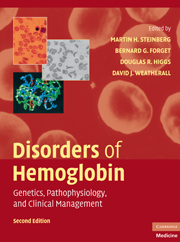Book contents
- Frontmatter
- Contents
- List of Contributors
- Foreword, by H. Franklin Bunn
- Preface
- Introduction, by David J. Weatherall
- SECTION ONE THE MOLECULAR, CELLULAR, AND GENETIC BASIS OF HEMOGLOBIN DISORDERS
- SECTION TWO PATHOPHYSIOLOGY OF HEMOGLOBIN AND ITS DISORDERS
- SECTION THREE α THALASSEMIA
- SECTION FOUR THE β THALASSEMIAS
- SECTION FIVE SICKLE CELL DISEASE
- SECTION SIX OTHER CLINICALLY IMPORTANT DISORDERS OF HEMOGLOBIN
- SECTION SEVEN SPECIAL TOPICS IN HEMOGLOBINOPATHIES
- SECTION EIGHT NEW APPROACHES TO THE TREATMENT OF HEMOGLOBINOPATHIES AND THALASSEMIA
- Index
- Plate section
SECTION SEVEN - SPECIAL TOPICS IN HEMOGLOBINOPATHIES
Published online by Cambridge University Press: 03 May 2010
- Frontmatter
- Contents
- List of Contributors
- Foreword, by H. Franklin Bunn
- Preface
- Introduction, by David J. Weatherall
- SECTION ONE THE MOLECULAR, CELLULAR, AND GENETIC BASIS OF HEMOGLOBIN DISORDERS
- SECTION TWO PATHOPHYSIOLOGY OF HEMOGLOBIN AND ITS DISORDERS
- SECTION THREE α THALASSEMIA
- SECTION FOUR THE β THALASSEMIAS
- SECTION FIVE SICKLE CELL DISEASE
- SECTION SIX OTHER CLINICALLY IMPORTANT DISORDERS OF HEMOGLOBIN
- SECTION SEVEN SPECIAL TOPICS IN HEMOGLOBINOPATHIES
- SECTION EIGHT NEW APPROACHES TO THE TREATMENT OF HEMOGLOBINOPATHIES AND THALASSEMIA
- Index
- Plate section
Summary
Three chapters in this section, Population Genetics and Global Health Burden, Genetic Modulation of Sickle Cell Disease and Thalassemia, and Developments in Laboratory Methods to Detect Hemoglobinopathies, cover diverse subjects.
Without endemic malaria, the genes for HbS, HbC, HbE, and the thalassemias would not exist at polymorphic frequencies as the selective pressure from Plasmodium falciparum is so strong. Weatherall and Williams discuss the “Malaria hypothesis,” and the evidence that carriers of thalassemia and HbS, HbC, and HbE are protected from P. falciparum infection, although the mechanisms behind such protection are incompletely understood. The health burden of hemoglobinopathies and thalassemia is great, particularly in developing countries, and it is likely to increase as development proceeds. Many obstacles to providing genetic services are discussed, among them, the prioritization of scant healthcare resources and the problems posed by communicable disease and malnutrition, leaving hemoglobin disorders underserved.
Hemoglobinopathy detection is often a part of the evaluation of anemia and microcytosis. It should first be determined, using hemoglobin high-performance liquid chromatography, whether a variant hemoglobin is present, how abundant the variant is, and whether the variant is relevant to the clinical picture. With background information from the patient's history, studies of informative family members, physical examination, blood counts, and erythrocyte indices, high-performance liquid chromatography can suggest the genotype of sickle cell disease. Thalassemia mutations are multitudinous and only DNA-based studies can pinpoint the genotype of this disease.
- Type
- Chapter
- Information
- Disorders of HemoglobinGenetics, Pathophysiology, and Clinical Management, pp. 623 - 624Publisher: Cambridge University PressPrint publication year: 2009



